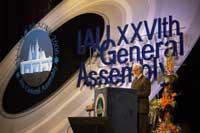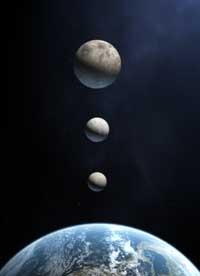This is a planet
2006/08/25 Rementeria Argote, Nagore - Elhuyar Zientziaren Komunikazioa

To answer these questions it was necessary to agree on a definition of the word planet. And in the end the decision was made by the International Astronomers Union (at the general assembly held in Prague). A planet is a celestial body that fulfills three conditions: one, orbiting around the Sun; two masses sufficient for its gravity to overcome the forces of rigid bodies, that is, for the form to have a hydrostatic equilibrium (almost circular); and three, the orbit around it is ‘clean’.
There are therefore eight planets in our solar system: Mercury, Venus, Earth, Mars, Jupiter, Saturn, Uranus and Neptune. Pluto, therefore, is out of this list: it will no longer be a planet. Pluto and the other three so-called planets (Ceres, Charon and 2003 UB313) say they are dwarf planets.
They have also defined what the dwarf planet is. It is a celestial body of four characteristics: one with orbit around the Sun, two with enough mass so that its gravity exceeds the forces of rigid bodies, that is, so that the shape has a hydrostatic balance (almost circular); three, without ‘cleaning’ the surrounding orbit; and four, it is not a satellite.

These are therefore dwarf planets like Pluto, Ceres, Karon and 2003 UB313 (expecting a more appropriate name), but they will also come more. In fact, there are several candidates for dwarf planet (Sedna, Orkus, Palas, El Motor and eight others) and, as solar systems are explored, there will be more candidates.
Thus, with these two definitions, astronomers have classified the bodies of our solar system into three groups: planets, dwarf planets and small bodies of the solar system. The latter are all other bodies orbiting around the Sun (which are not satellites of planets, dwarf planets or planets): asteroids, comets and other small bodies.
It seems that at least the subject of the planets has been clarified.



